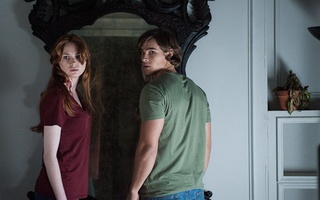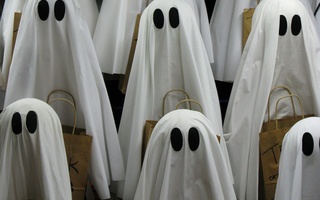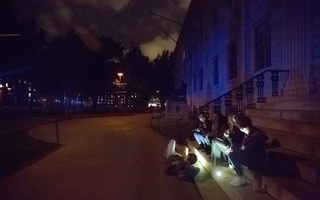{shortcode-ccef3d4dc98b1565a99f44503970b480b8712292}
Regarded as one of the most iconic and well-written ghost stories of all time, Shirley Jackson’s novel “The Haunting of Hill House” has terrified audiences since its release in 1959. The tale has already been turned into a play and adapted into two movies, but that didn’t stop Netflix from announcing it would be producing a 10-episode series based off the classic ghost story back in August. Mike Flanagan, the director, has already earned buzz for his work on “Oculus,” “Hush,” and most recently “Gerald’s Game,” but “The Haunting of Hill House” might be his most ambitious project yet. A classic plot of a family living inside a house filled with ghosts stretched out into 10 hours is risky, but Flanagan and his committed actors have created something thoroughly gripping, terrifying, and equally refreshing.
The show follows the Crain family of seven, showing both their history living in the house of horror, as well as the present day. This allows them to interweave their childhoods with the psychological scars that have lasted into their adult lives. Unlike the creative and brilliantly original concepts behind movies like “Get Out” and “A Quiet Place,” this horror series might seem too reliant on clichés. From the first few episodes alone, we are blasted with the typical tropes of ghosts terrorizing people in their sleep, a mysterious locked room, a dark, decrepit cellar, and even a kid drawing creepy, ominous monsters in crayon. Of course, while the plot from an outside perspective might appear stale, Flanagan still manages to demonstrate his unique skills and bring his own inventive flavor to the story. One of the creepiest and arguably the most brilliant detail of Flanagan’s masterpiece is the hidden ghosts — and no, not the “Bent-Neck Lady” or the rotting zombie in the basement who get an ample amount of bone-chilling screen time. It’s difficult to notice every single pale, mysterious figure in an initial viewing, but that isn’t necessary. Adding to the overall dark tone and enhancing the creepiness factor, spotting even one in this twisted version of “I Spy” is enough to keep a viewer on edge.
Another way “Hill House” escapes horror tropes is through its unique perspective on trauma and the residual, life-altering effects it can have. The five Crain children, Steve (Michiel Huisman), Shirley (Elizabeth Reaser), Theodora (Kate Siegel), Luke (Oliver Jackson-Cohen), and Nell (Victoria Pedretti) each grow up to lead tormented lives, still haunted by grief and fear from their days in the evil house. Perhaps horror writer Steve sums it up best when he tells a fan, “A ghost can be a lot of things: a memory, a daydream, a secret, grief anger, guilt. In my experience, most times, they’re just what we want to see.” Their psychological ghosts lead them down paths of addiction, denial, and emotional repression. What may make “Hill House” so refreshing is not the grotesque ghosts dwelling in the old mansion but rather the raw, human-scale problems that slowly deteriorate this scarred family.
Another hurdle Flanagan needed to surmount is the the overall run-time. While a typical horror movie only has to maintain suspense, keep the audience on their toes, and provide an ample amount of spooks for two hours, Flanagan somehow had to translate that same effect into 10. The key to sustaining the tension and preventing the audience from becoming too habituated to the horror is the nonlinearity of the show. Working to reveal the whole story slowly but deliberately, each episode focuses in on a specific character’s unique, traumatic experience and attempts to lay the story’s foundation piece by piece.
While such a compelling story structure results in some shocking plot twists and a satisfying, climatic finale, it also allows the audience plenty of time to grow emotionally connected to its characters. Liv Crain’s (Carla Gugino) descent from loving mother into tormented insanity might be the most tragic arch of the show, and Gugino’s performance is both breathtaking and heartbreaking. However, the most fascinating, groundbreaking part might be Theo Crain (played by Katie Siegel as an adult and McKenna Grace as young girl). Blessed but also cursed with the ability to experience others’ emotions merely by touch, Theo chooses to isolate herself, constantly wearing a pair of gloves and unwilling to open up to her family or romantic partners. Despite her closed-off nature, her strong-willed, no-nonsense attitude makes her extremely likable. Theo is lesbian, but the show thankfully does not tokenize her sexuality as her primary character trait. Setting an example for fair BGLTQ representation in the media, “Hill House” treats a complex character like Theo with the nuance and proper care she deserves. Effortlessly exuding confidence and intensity while also breaking down in one of the show’s most tear-jerking scenes, Siegel thrives in her role.
While sitting through 10 hours of horror might seem like a major commitment, the show is worth it without a doubt. Using the classic haunted house trope merely as a branching-off point, “The Haunting of Hill House” weaves a scary and profound narrative. To fans of both the horror and family drama genres alike, this series will not disappoint. Prepare to jump out of your seat a few times with fright but also to walk away clinging to loved ones a little tighter with appreciation.
Read more in Arts
‘Mr. Burns: A Post-Electric Play’ Brings the Contemporary Political Climate to StageRecommended Articles
-
"I Want to See Dead People": A Tour of Sleepy HollowI love horror movies and I love a good scare. So, being too impatient to wait for the Thanksgiving release
-
 'Oculus' Is a Fresh Look at the Horror Movie Genre
'Oculus' Is a Fresh Look at the Horror Movie Genre -
 The Word: Haunt
The Word: Haunt -
 The Horror Genre Takes a Page out of History Textbooks in 'Lore'
The Horror Genre Takes a Page out of History Textbooks in 'Lore' -
 Secrets of Harvard Revealed: An Interview with Professor Zachary Nowak
Secrets of Harvard Revealed: An Interview with Professor Zachary Nowak













